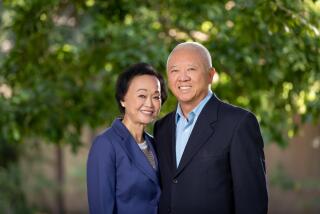Where to Turn for Data on Cancer
- Share via
Cancercare.org
Overview: Cancer Care, one of the nation’s leading cancer service organizations, offers detailed disease information, plus free counseling, education, referrals and even financial advice and assistance. From practical tips to emotional solace, the 56-year-old organization--and its site--provides it all.
What Works: The avenues of information just keep sprawling before you: updated facts, clinical trial information, a patient network--even a user-friendly way to help shape federal cancer policy. Perhaps the best feature is the Helping Hand Resource Database, a list of state and local cancer-related resources. Also, you can sign up to participate in weekly teleconferences, some in Spanish, on such topics as treatment options and support for caregivers. In fact, Cancer Care’s education director reports that 600 to 1,000 people participate in each call. You can even communicate one-on-one by e-mail or phone with an oncology social worker. And the site offers resources to deal with transportation and employment challenges.
What Doesn’t: The real gems are often buried. For example, hidden deep in the narrative definitions of various cancers are valuable links to other Web sites. In addition, the support groups listed are only in the New York region. You have to dig a little (in the resource guide, plug in “counseling” and “California”) to find referrals to the Wellness Community and Cancervive, which are among Cancer Care’s recommendations in the Los Angeles area for in-person counseling and support group options.
Cycleofhope.org
Overview: This 6-month-old site gained popularity with the recent Tour de France victory of cancer survivor Lance Armstrong. It is the online component of a larger Cycle of Hope cancer education campaign sponsored by the Lance Armstrong Foundation and Bristol-Myers Squibb (makers of the chemotherapy drugs that helped save his life). Designed to motivate and inspire people to manage their cancer, it offers a diagnostic “wheel” listing cancer risks, signs and symptoms; an explanation of the roles of different treatment team members; specific questions for your oncologist (medical, radiation and surgical); and tips for caregivers.
What Works: The cycling theme appears throughout, encouraging people to “equip themselves” to battle cancer as Lance did in “tackling a racecourse.” Visitors have reported that it’s just what they needed to move past the denial-imposed “paralysis” that often accompanies a cancer diagnosis, to an “I think I can” attitude. Swaths of bright yellow pop out on almost every page, with concise, helpful tips to keep visitors hopeful and in charge. In addition to Armstrong’s story of how he beat advanced testicular cancer, other survivors’ stories (“messages of hope”) are posted for quick reading.
What Doesn’t: The site only scratches the surface of nine types of cancer. Because it does such a great job of motivating and inspiring, it would be nice to have more medical facts about cancer. Even with the links provided, you’re left wanting more information.
Worth Checking Out: Other cancer-related sites are https://clinicaltrials.gov (sponsored by the National Institutes of Health), https://www.acor.org (Assn. of Cancer Online Resources), and https://www.cancerguide.org (especially good for the pros and cons of researching your cancer).
*
Cathy K. Purcell contributed to this column.
* Marla Bolotsky is director of online information for the Henry J. Kaiser Family Foundation. She can be reached by e-mail at marla.bolotsky@latimes.com. Your Health Online runs the first and third Mondays.






